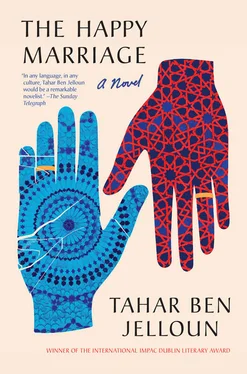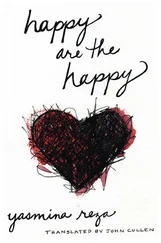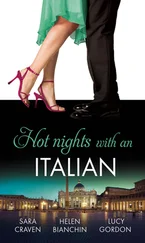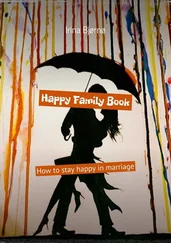I went to Marrakech. I had to wait for days to secure a meeting with Wallada — people called her that because she’d been a midwife in her youth. As soon as she saw me, Wallada said: “My poor girl, I’m glad you’ve finally come to see me; good, come and sit right there in front of me and give me a little something so we can begin our session.” I pulled out a two-hundred-dirham note and placed it next to her. She was a very powerful woman. She wasn’t a clairvoyant, but she could read people’s faces and was adept in palmistry. She told me all about my life as though she’d been there every step of the way. She knew everything and described the malevolent people in my life. I was impressed with her talents because she could tell who I was just by looking at me, and figured out the root of my unhappiness. Wallada came from the countryside and was illiterate, but she could write incomprehensible signs endowed with magical powers. I could see she was already hard at work while she was still talking to me. She dipped her reed into some sepia ink and drew a series of mysterious symbols, each more cryptic than the last, that I would be able to use to ward off evil spells.
My session cost me a thousand dirhams, but it brought me some relief, and I left equipped with the means to counteract all that Foulane’s sisters had dared to inflict on me. It helped me to give up on my husband’s family. I was polite to them whenever I saw them, and I would mouth my insincere As-Salaam-Alaikums . The woman from Marrakech and my taleb continued to work to ensure I was protected. I remained on my guard. I carried my taleb ’s talismans with me at all times. Once every six months, the taleb would melt some bronze in a saucepan and mix it with a brew made of water and herbs that came from various places, which he would put in a bottle and hand over to me. I would use some of that yellowish liquid on my body before showering. During the worst of their attacks, I felt as though I was losing my mind, and surrounded by Evil, by powers that wanted to harm and destroy me. I could see it in Zoulekha’s eyes. She was Foulane’s nastiest and most envious sister, filled with absolute hatred. She looked at me as though she wanted to set fire to everything I did. One day she gave me a ring made of gold and silver. When I showed it to the taleb , he ordered me to take it off and give it to him. It was a booby-trapped ring, which had been made to counteract all the protective spells that he’d prepared for me. When I gave it back to her, she looked all surprised. I told her it was too tight for me and that I was allergic to gold. She smiled at me and pouted, as if to say, “Don’t worry, you’ll get what’s coming to you!”
This is how I put up a fight against his family.
Foulane was right when he said my family often came to see me. They protected me and I could count on them. He was also right that a few girls from my village came to live with us so they could help out with the children. Yes, my family always came first, and no, I never liked any of his relatives. I had my reasons but he didn’t want to understand them. I refused to let any of his nephews and nieces come over, because they were brattish and disrespectful. On one occasion when one of his nieces — a fat, stupid girl who’d failed her exams — was staying with us, I refused to let her loaf around the house, so I asked her to help me clean the children’s bedrooms. She refused, so I asked her to leave. Her reply was: “You don’t have the right to boss me around, I’m at home here, this is my uncle’s house, you can’t kick me out.” So I threw all her belongings out onto the street and she went running to her uncle’s arms. Foulane heaped a bunch of abuse at me that night.
His family always hated me. But I eventually stopped caring. It didn’t get to me anymore, but he was the one who refused to see them for who they really were. He didn’t believe me when I told him about all the amulets I’d found scatted around the house. “You’re sick,” he told me, “you’re just making it all up.”
We didn’t frequent the same people, partly because of the age difference, but also for class reasons. My friends were mostly immigrants. His were intellectuals, internationally renowned artists, writers, politicians, and they were all full of themselves. They looked at me condescendingly, often with the sort of kindness with which adults treat children.
I remember how, right at the beginning of our relationship, an Algerian woman — or was she Tunisian? — who was ugly and vulgar and married to a much older French man had screwed her face up so that she looked even uglier and said: “You’ve won the jackpot!”
“You’re an idiot!” I’d replied.
The jackpot! Yes, a jackpot of troubles and contempt. I was always suspicious of the people around him, but he stood up for them and preferred their company to mine. But when they screwed him over, he always came crying to me, at which point I would happily tell him to get lost.
After all those years of married life, we only managed to have a few mutual friends. There weren’t many of them and I was never fully at east with them because they had such admiration for the great painter whom the king had bestowed his honors on after purchasing a dozen of his paintings at full retail value. What truly bothered me was that nobody gave me any recognition for always being right there for him, pushing him to work, and taking care of all of life’s essentials in order to free him from all responsibilities.
I raised our children on my own. I would tell them that their father needed to work and that he couldn’t be disturbed. I spared him all the hassles. Which explained why I always told his friends — whether they were his real friends or so-called friends — that I was one of the big reasons behind his success, but that my efforts went unrecognized, which was the fate that befell the wives of famous men, especially artists’ wives.
As we didn’t have the same friends, I told him to leave me alone whenever I went out with mine from time to time. I usually only hung out with girls, because we had more fun that way, we spilled our guts, swapped gossip, jokes, laughed, let ourselves go, and hardly noticed how the time flew by. But Foulane would always call me and ask me to come back home. I would tell him to leave me alone: “I’ll come back when I feel like it!” He hated me for saying that. Whenever I returned, he wouldn’t be able to sleep and would blame his insomnia on me. At which point he would go sleep in another room under the pretext that I stank of booze.
His friends often meddled in our business. They would call me and ask me to come see them because they had something important to tell me. Once I got there, they would lecture me: “Don’t you know how lucky you are to share your life with such a great artist? People both admire him and are jealous of him, you must help make his life easier and not bother him with such silly things. He gets easily depressed, and he only wants a little peace so he can work. You see, he feels overwhelmed by your family, he can’t put up with them.”
On one occasion, instead of replying, I just shouted at them to stay out of our lives.
At which point Foulane lectured me: “How could you treat my childhood friends like that? They’re only trying to help.”
There were always misunderstandings, whether with him or with his friends.
Until the day I met Lalla, which changed everything. Foulane’s jealousy for her gnawed away at him and made him furious and violent. He refused to speak while at the dinner table, but simply gave commands with his hands. All because I’d finally found someone who understood me, who helped me endure all the things he or his family and friends did to me. I was tired of being seen simply as a mother. I wanted to fulfill myself, to have a life of my own, and overcome all the defeats I’d suffered. When I met Lalla, I had the strange feeling that I’d met my soul mate, someone who knew the contents of my heart and my mind. She possessed a natural sweetness that she’d acquired during those years she’d spent in India studying with a guru whose name I’ve forgotten. She’d given me his books and we spent a lot of time discussing them. She opened my eyes and showed me a path, teaching me that I was a sensitive person endowed with incredible potential that my husband had always stifled. She helped me to see the wounds that my marriage had dealt me. She had a positive outlook on life. New horizons opened up before me. I felt like a child who’d been introduced to the school of life while in her presence. I realized how much time I’d wasted trying to fix things. Lalla held out her hand to me, and I will never forget that. In her, I’d finally met someone who was interested in me but asked for nothing in return. I spent hours at her place and we’d talk ourselves to sleep. Foulane immediately suspected we were lovers. Men are crazy! As soon as two women get together they suspect them of being lesbians. Lalla wasn’t a lesbian. She liked men and made no secret of it. I even suspect she had lovers, but we never talked about that. Her reputation completely distorted who she really was. Men envied her freedom, beauty, and generosity. She was someone who spent all her time helping others.
Читать дальше












